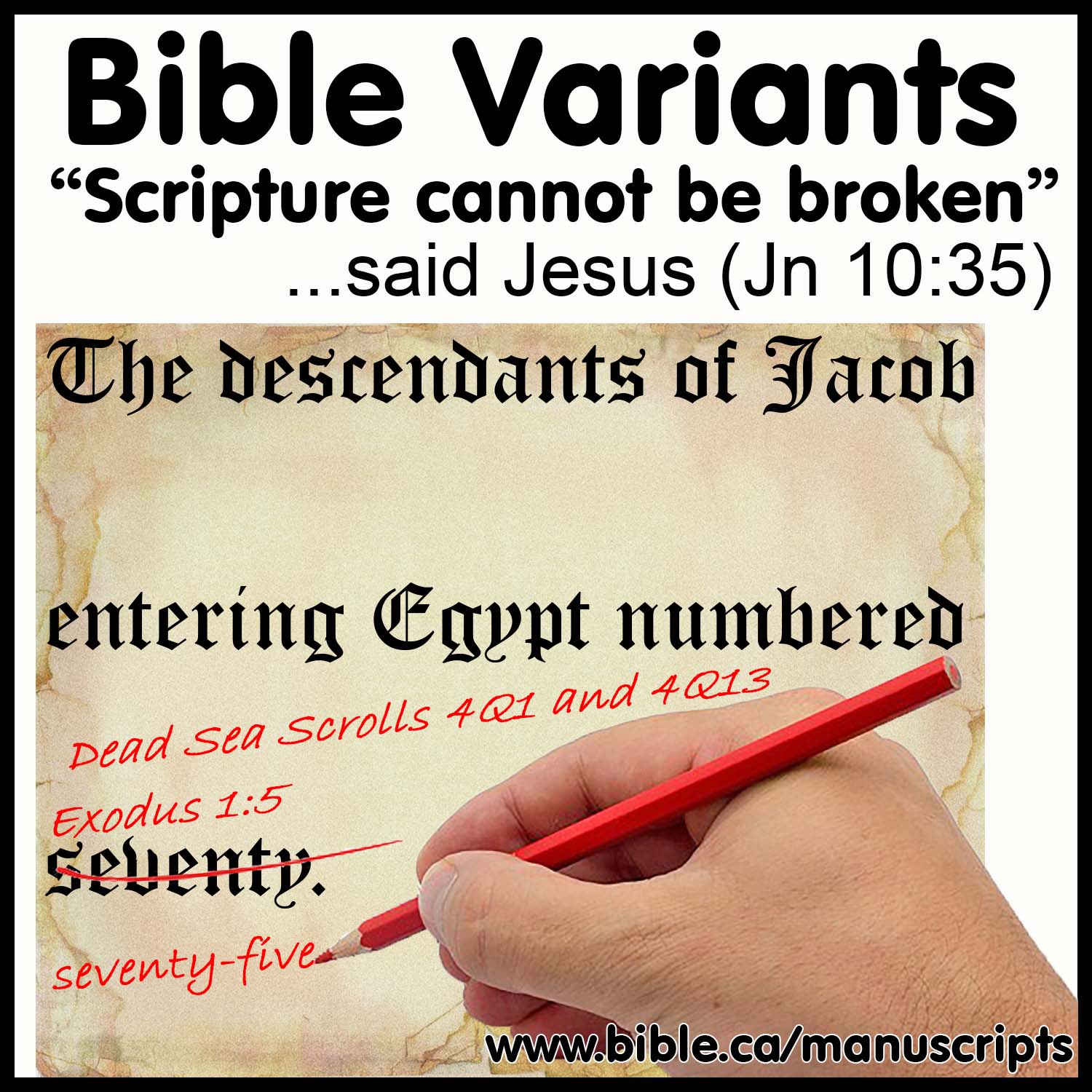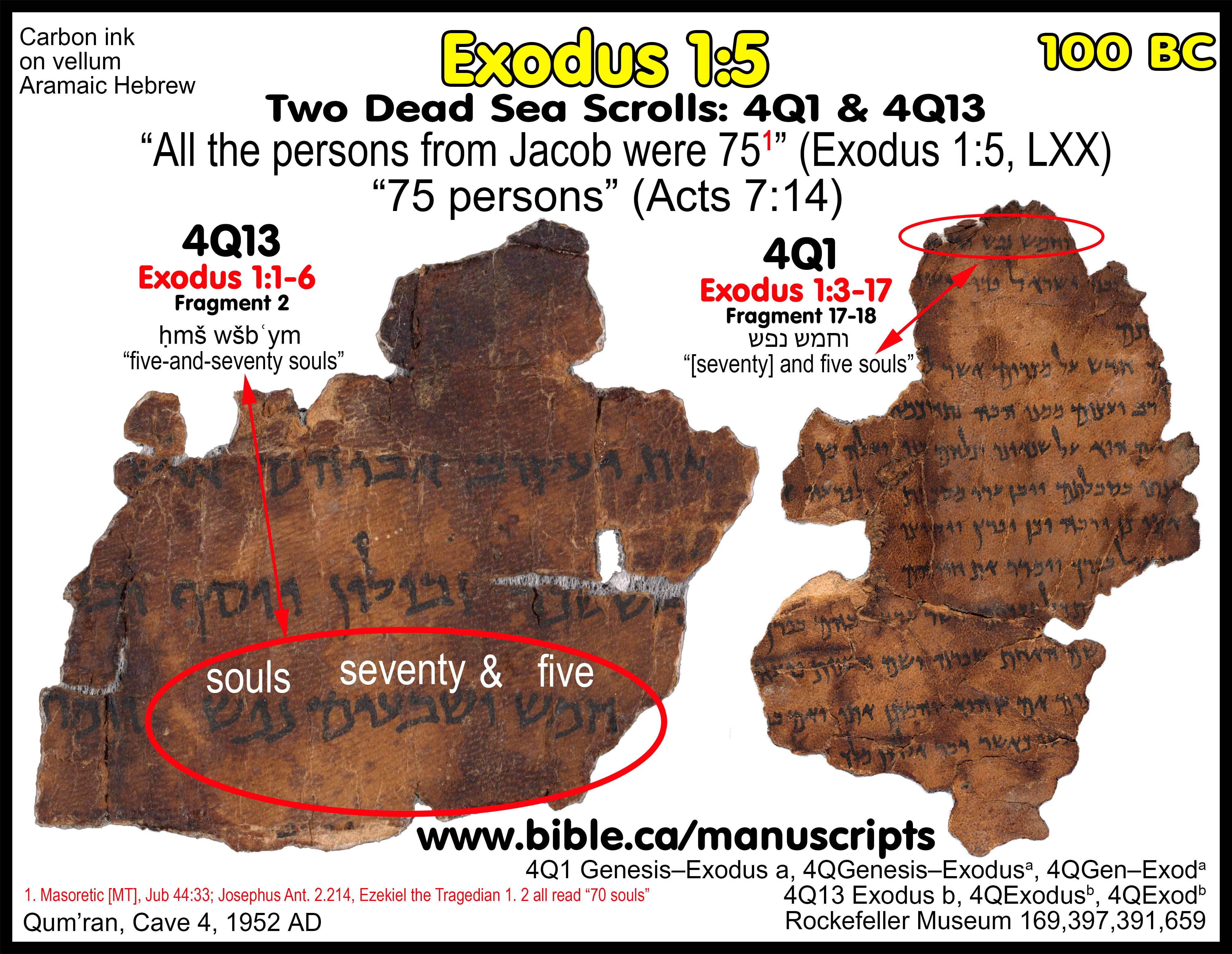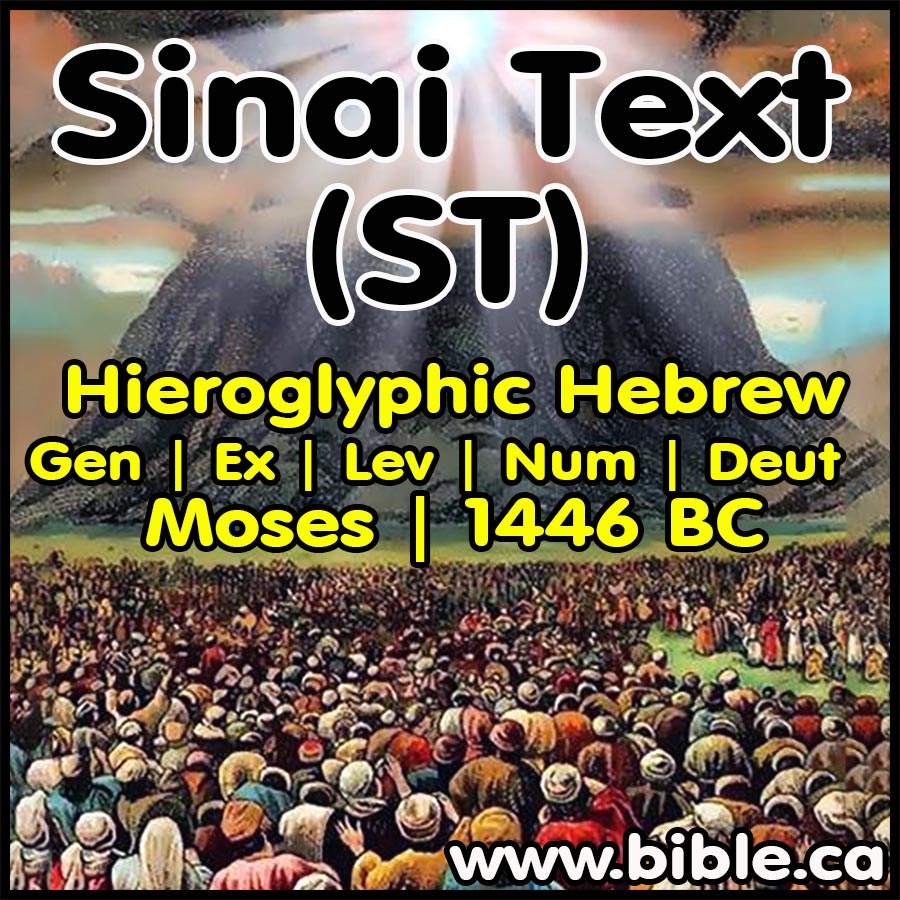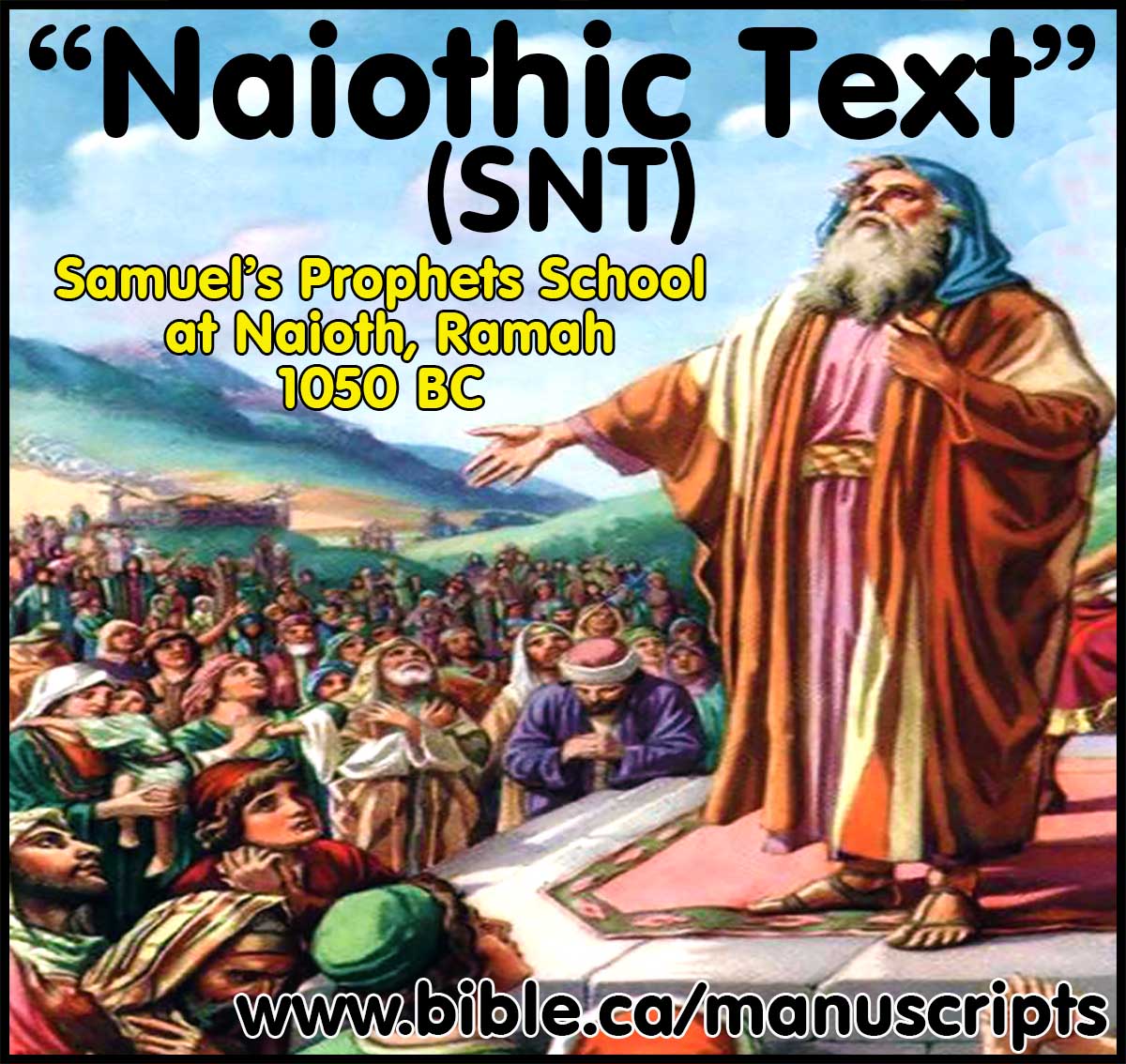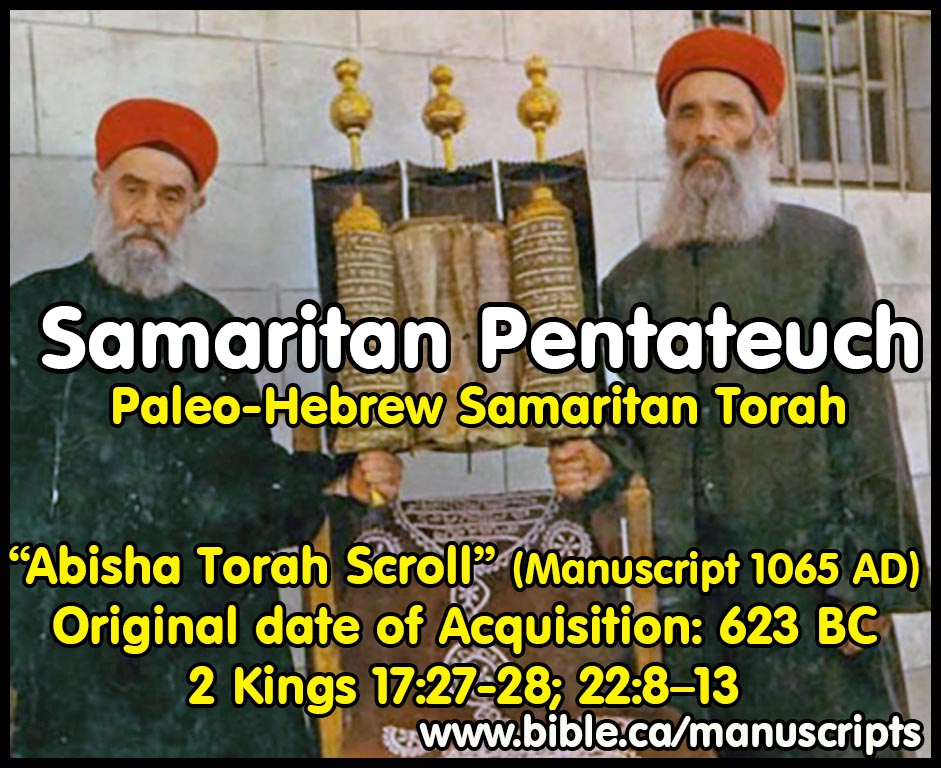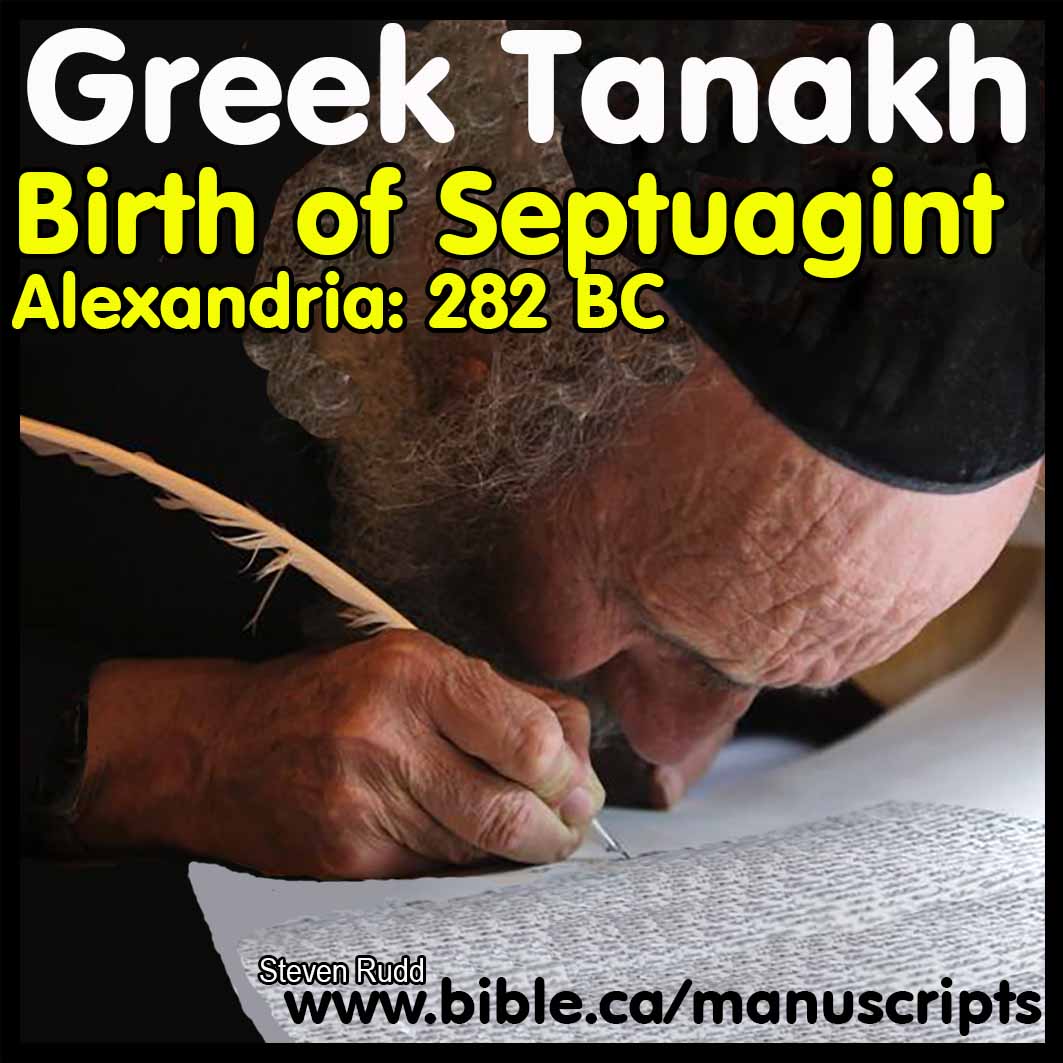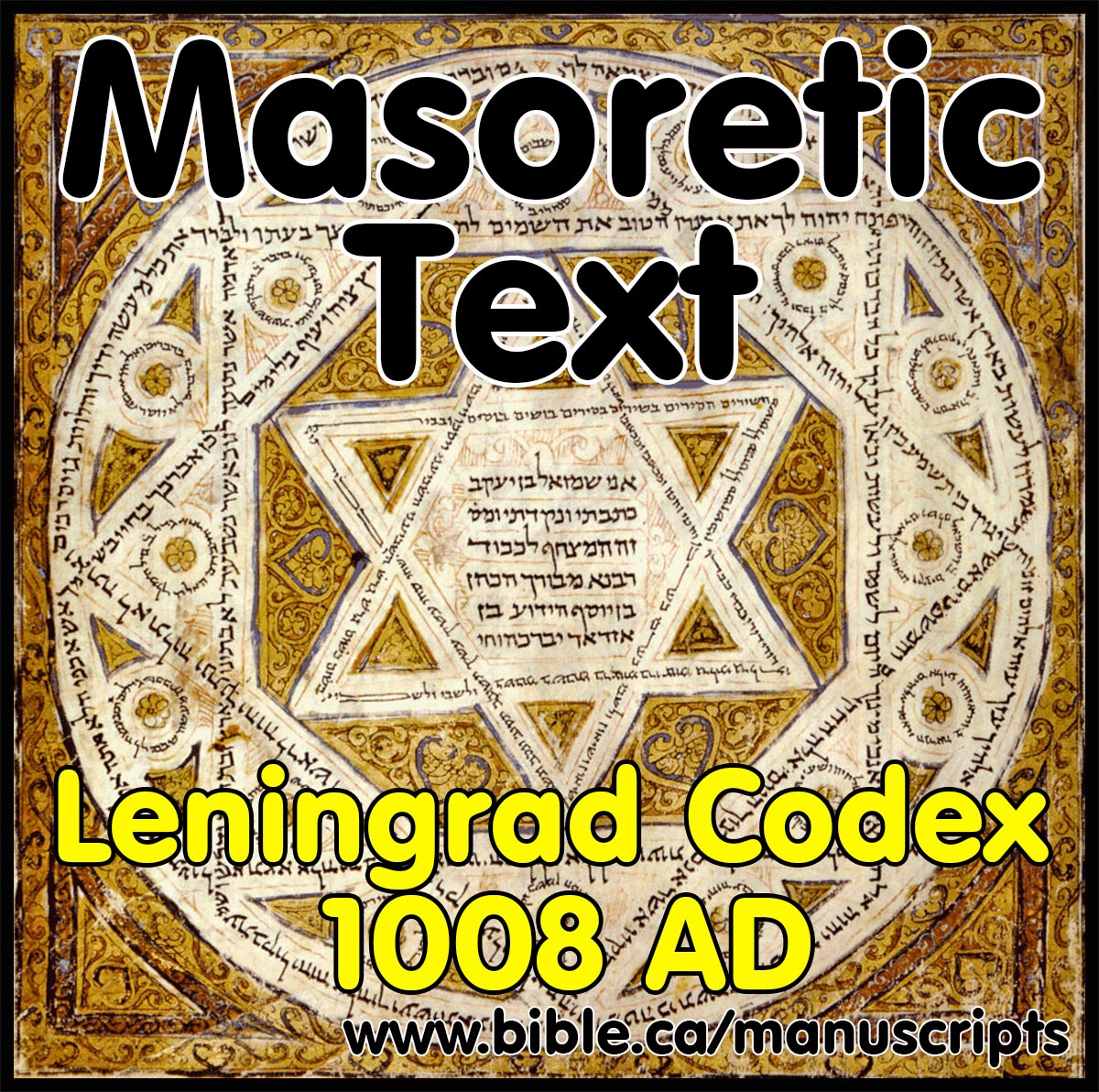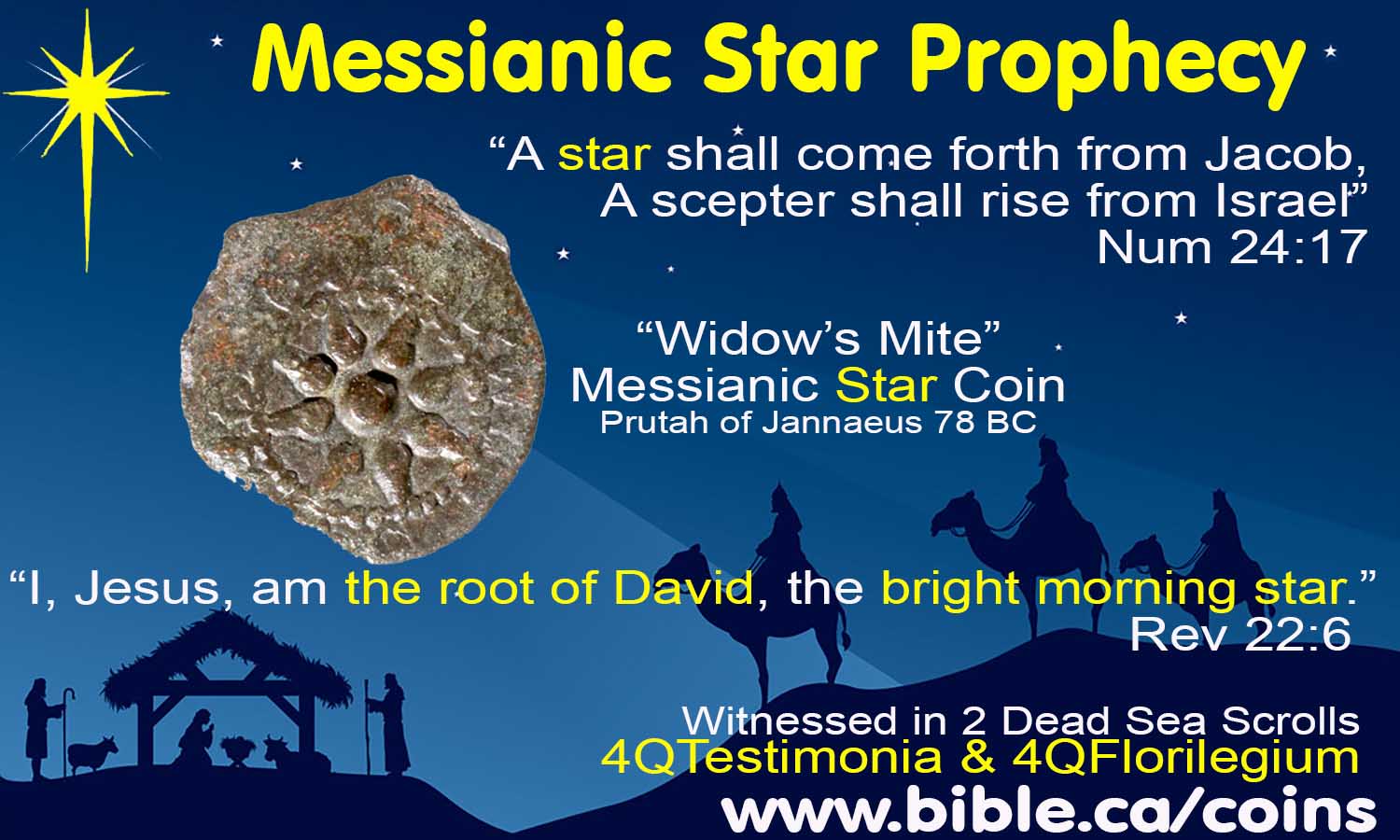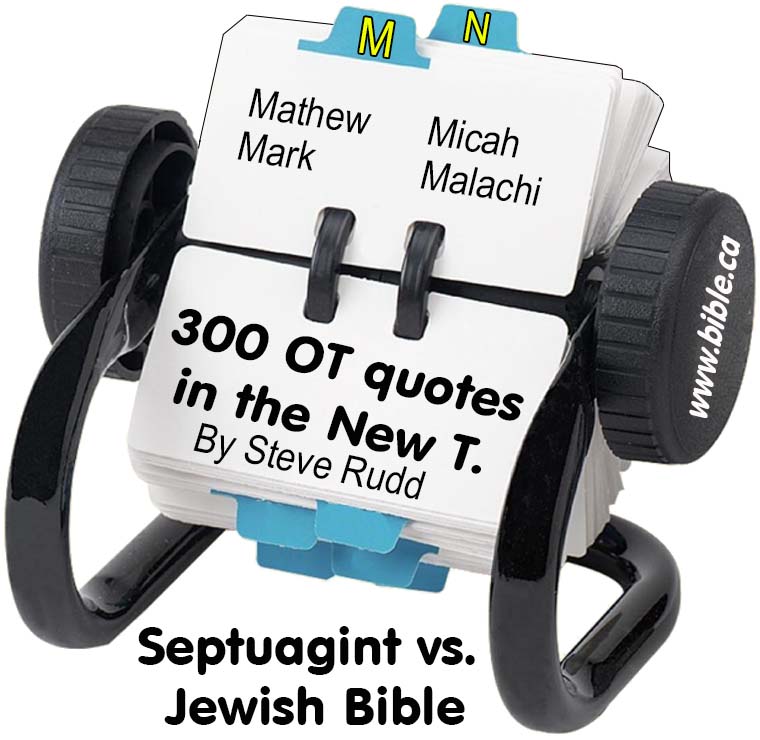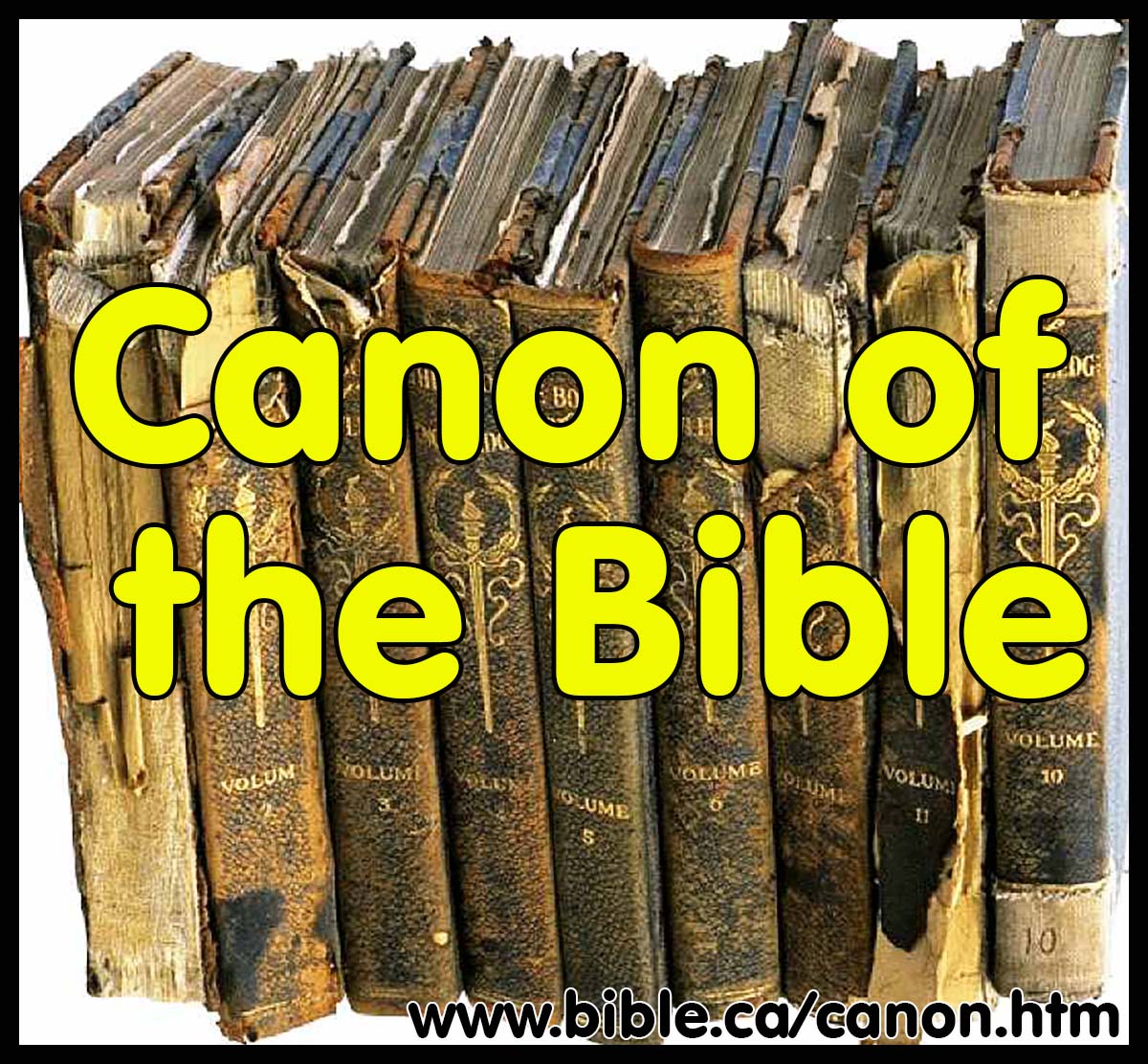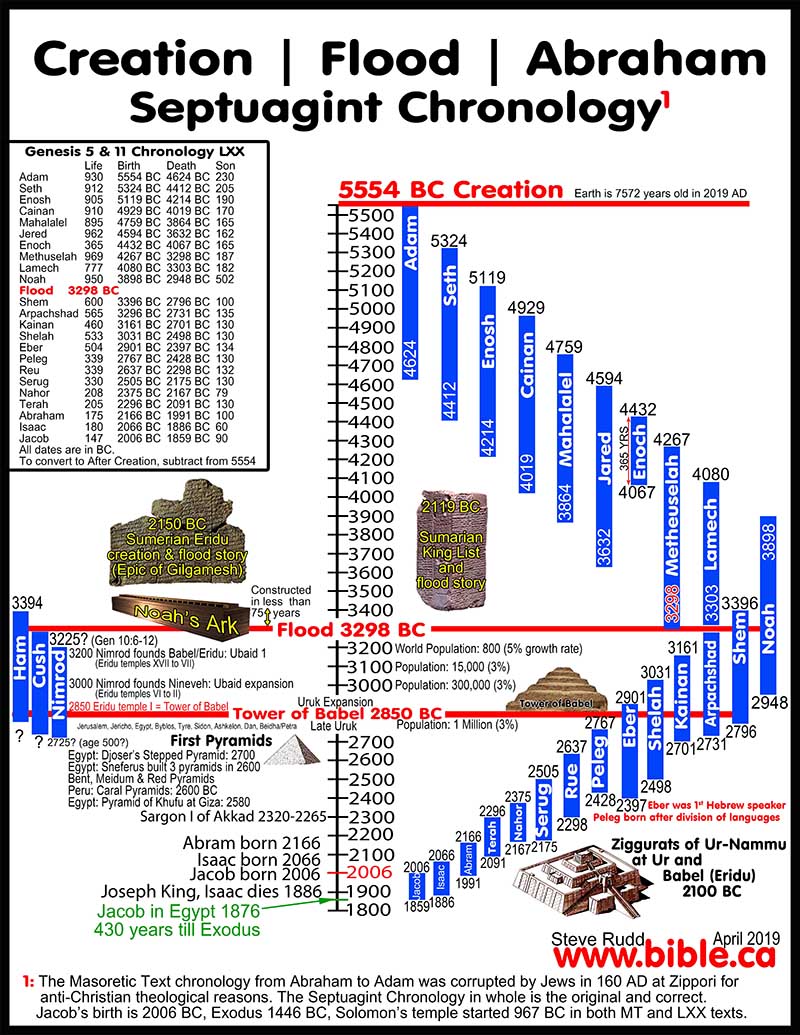|
Jacob enters Egypt with 70 or 75 persons: Gen. 46:27; Ex 1:5; Deut 10:22; Acts 7:14 Single Textual Variants in the Bible "Scripture cannot be broken" (Jesus, John 10:35) "My word will accomplish what I desire and succeed in the purpose for which I sent it." (Isa 55:11) Steve Rudd November 2017 |
Two Dead Sea Scrolls read 75 persons in Ex 1:5 validating the Septuagint:
Jacob enters Egypt with 70 or 75 persons: Gen. 46:27; Ex 1:5; Deut 10:22; Acts 7:14
Textual Variants in the Bible
Bible textual variants analysed
Introduction:
Did Jacob enter Egypt with 70 or 75 persons? When Christian looks up these four passages (Gen 46:27; Ex 1:5; Deut 10:22; Acts 7:14) in the top five modern English translations (NASB, KJV, NIV etc.) there appears to be a contradiction between the Old Testament where all passages read 70 persons and the New Testament where Stephen said the number was 75 persons who entered Egypt with Jacob in 1876 BC. Bible trashers throw an ill planned and premature party because the Septuagint records 75 persons in two places in the Torah. This gloss is complex and simple at the same time. Gen 46:27 and Ex 1:5 are both variant between the MT and the LXX where one says 70 and the other 75. A third verse, Duet 10:22 reads 70 in both the MT and LXX. Finally Acts 7:14 says the number was 75 persons who entered Egypt. But two Dead Sea Scrolls (100 BC) 4Q1 and 4Q13 both read 75 persons in Ex 1:5. Literary sources are also divided in that Jubilees (150 BC), Ezekiel the Tragedian (150 BC) and Josephus (70 AD) all agree to read 70 but Philo (30 AD) reads 75. The solution is simple. Both numbers are used in the Torah because there were different methods of calculating the number as seen in both the Bible and literary sources. The Septuagint reflects the original reading of 75 in Gen 46:27 and 70 in Ex 1:5. For unknown reasons the Masoretic text was changed so all three places in the Torah agree to read 70 persons entered Egypt. What is significant for the Christian is that Stephen is fully validated in his “75 persons” from the Septuagint, Philo and two Hebrew language Dead Sea scrolls which also record 75.
Discussion:
I. Primary Bible witness: 70 vs. 75 persons:
1. This is a complex issue because four places in the Bible the numbers 70 vs. 75 are referenced:
a. The Masoretic Text (MT) reads 70 persons in all three old Testament Texts: Gen. 46:17; Ex 1:5; Deut 10:22
b. The Septuagint (LXX) reads 70 persons in one text: Deut 10:22
c. The Septuagint (LXX) reads 75 persons in two texts: Gen. 46:27; Ex 1:5
d. The New Testament reads 75 persons in Acts 7:14
2. Variant Bible verses: Exodus 1:5
a. "All the persons who came from the loins of Jacob were seventy in number, but Joseph was already in Egypt." (Exodus 1:5, MT)
b. "Joseph was already in Egypt. And all the persons from Jacob were seventy-five." (Exodus 1:5, LXX)
3. Variant Bible verses: Genesis 46:27
a. "and the sons of Joseph, who were born to him in Egypt were two; all the persons of the house of Jacob, who came to Egypt, were seventy." (Genesis 46:27, MT)
b. "The sons of Joseph who were born to him in the land of Egypt were nine individuals. All the individuals of the house of Jacob who entered into Egypt were seventy-five." (Genesis 46:27, LXX)
4. The MT and LXX both read 70 persons in Deut 10:22
a. "Your fathers went down to Egypt seventy persons in all, and now the Lord your God has made you as numerous as the stars of heaven." (Deut 10:22, MT)
b. "With seventy people your fathers went down into Egypt, but now the Lord your God made you as the stars of heaven in number.”" (Deut 10:22, LXX)
5. Stephen in the New Testament reads 75 persons: Acts 7:14
a. "Then Joseph sent word and invited Jacob his father and all his relatives to come to him, seventy-five persons in all.” (Acts 7:14)
b. “Finally, we turn to Stephen’s speech before the Sanhedrin, one which is supposedly riddled with historical error. How could this be possible for this Jewish man who, according to Acts, was “full of faith and of the Holy Spirit” (Acts 6:5) and “full of God’s grace and power” (6:8) and of whom it is recorded that the Jews who opposed him “could not stand up against his wisdom or the Spirit by whom he spoke” (6:10)? Their answer is quite simple: First, some of the contradictions are only apparent such as Acts 7:14, where Stephen says, “Joseph sent for his father Jacob and his whole family, seventy-five in all,” whereas “Genesis 46:27 (MT) sets the figure at seventy (i.e., sixty-six plus Jacob, Joseph, and the latter’s two sons).” This, however, presents no difficulty, and, as has often been pointed out, “Genesis 46:27 in the LXX, for example, does not include Jacob and Joseph but does include nine sons of Joseph in the reckoning, thereby arriving at ‘seventy-five souls’ all together who went down to Egypt. And with this number both Exodus 1:5 (LXX) and 4QExoda at 1:5 agree.” So then, a Hebrew, biblical scroll from Qumran along with the LXX both counted the number at seventy-five rather than seventy, so Stephen was in good company with his figures here. This is hardly an error!” (Answering Jewish objections to Jesus: New Testament objections, M. L. Brown, Vol. 4, 2007 AD)
II. Archeological and Literary sources: 70 vs. 75 persons:
1. Jubilees 44.33 has both computations of 70 then lists 75 as the grand total and says 5 died in Egypt:
a. “And all the souls of Jacob which went into Egypt were seventy souls. These are his children and his children’s children, in all seventy; but five died in Egypt before Joseph, and had no children.” (Jubilees 44.33, 150 BC)
2. Ezekiel The Tragedian: 150 BC: “70 persons”
a. “Exagōgē” is a Jewish six-scene play in Greek based upon the Exodus.
b. “Ezekiel The Tragedian: An author of Jewish tragedies who wrote in Greek, likely in the second century BC. The surviving fragments of his tragic drama about the Exodus are often grouped together with the Old Testament Pseudepigrapha, since they are nonbiblical Jewish writing from the same period. Clement of Alexandria refers to Ezekiel as “the poet of Jewish tragedies” (Stromata 1.23.155.1, quoted in Robertson, “Ezekiel,” 803). However, we only know of one of his works, titled Exagoge, “Leading Out.” Moses is the main character of this tragedy, which covers material in Exodus 1–15, from Moses’ birth to the crossing of the Red Sea and the encampment of the Israelites at Elim. In the process of adapting the biblical material to the genre of Greek tragedy, Ezekiel adds extrabiblical material, including a dream by Moses and characters not mentioned in the Bible. Substantial fragments of Exagoge are preserved in Eusebius (Preparation for the Gospel 9.28–29), who cites them from the first century BC author Alexander Polyhistor, in Clement of Alexandria’s Stromata, and in Pseudo-Eustathius’ Commentary on the Hexameron.” (LBD, Ezekiel The Tragedian)
c. As far as we can reconstruct the play, the outline is as follows. In the first scene (vv 1–65) Moses summarizes in a long monologue the events recorded in Exodus 1–2. This is followed by the encounter with Jethro’s daughters (with several postbiblical developments, e.g., that Zipporah is identical to the Ethiopian wife of Moses in Num 12:1; see vv 60–62). The second scene (vv 66–89) contains, besides a short dialogue between Zipporah and a certain Chum, another nonbiblical scene, namely a report by Moses about a strange dream or vision he had in which he saw God enthroned on the summit of Mt. Sinai. God beckons him, hands over his regalia to Moses, descends from his throne, and orders Moses to sit upon it, whereupon all heavenly powers prostrate before him. Moses has been given all power in heaven and on earth (cf. Matt 28:18). The third scene (vv 90–174) describes how God commands Moses from the burning bush to lead his people out of Egypt (Exodus 3) and how he removes Moses’ doubts by performing the miracles with the rod and the leprous hand (Exodus 4). Subsequently, in a long monologue God enumerates the ten plagues that he will bring upon Egypt (Exodus 7–11; these plagues could, of course, not be put onstage) and gives the rules for the institution of Passover (Exod 12:1–20). In a fourth scene (vv 175–192) Moses repeats these rules before the elders of the people (Exod 12:21–28, with the significant omission of the obligatory circumcision of all participants; a concession to his pagan audience?). In the fifth scene (vv 193–242) an Egyptian messenger gives an eyewitness account of the complete destruction of the Egyptian army in the Red Sea (Exodus 14, with significant haggadic details, on which see Jacobson 1983: 136–52), which is a striking parallel to Aeschylus’ Persians where the crushing defeat of the Persian army is reported to the Persian queen, another well-known device for realizing dramatic scenes which were impossible to stage. In the sixth scene (vv 243–269) scouts report to Moses that they have found a paradisiacal place for the encampment (namely Elim, Exod 15:27) and describe at length a marvelous and gigantic bird that they have seen there. Undoubtedly the bird is a phoenix, whose appearance is always a symbol of the inauguration of a new era in history (or salvation history; see van der Horst 1982: 111–12; Jacobson 1983: 157–64). There must have been more acts in the play than the scenes enumerated, especially in view of the great time gap between vv 192 and 193 (scenes 4 and 5), but we do not know how many. This synthesis of biblical story, postbiblical haggadah, and Greek literary procedures makes the Exagōgē into one of the most typical products of Jewish Hellenism. (ABD, Ezekiel The Tragedian)
3. Philo, a non-Christian Jew was aware that the Hebrew and Greek texts before him used both 70 and 75 and goes into a lengthily discussion about it:
a. The fascinating thing is that Philo demonstrates the various ways of computing the number who went to Egypt.
b. This proves that Stephen, through inspiration was quoting the valid number of 75.
c. The truth is that there must have been two different textual traditions in these passages.
d. The problem is not that Stephen contradicted the Torah, but that the Torah “diverges considerably” with itself!
e. “Very appropriately, therefore, does the companion of knowledge think it right to leave the region of the outward sense, by name Charran; (198) and he leaves it when he is seventy-five years old; and this number is on the confines of the nature discernible by the outward senses, and that intelligible by the intellect, and of the older and younger, and also of perishable and imperishable nature; (199) for the elder, the imperishable ratio, that comprehensible by the intellect, exists in the seventy; the younger ratio, discernible by the outward senses, is equal in number to the five outward senses. In this latter also the practiser of virtue is seen exercising himself when he has not yet been able to carry off the perfect prize of victory;—for it is said, that all the souls which came out of Jacob were seventy and five;”—(200) for to him, while wrestling, and not shrinking at all from the truly sacred contest, for the acquisition of virtue, belong the souls which are the offspring of the body, and which have not yet acquired reason, but are still attracted by the multitude of the outward senses. For Jacob is the name of one who is wrestling and engaged in a contest and trying to trip up his antagonist, not of one who has gained the victory. (201) But when he appeared to have gained ability to behold God, his name was changed to Israel, and then he uses only the computation of seventy, having removed the number five, the number of the outward senses; for it is said, that “thy fathers went down to Egypt, being seventy souls.” This is the number which is familiar to Moses the wise man: for it happened that those who were selected as carefully picked men out of the whole multitude, were seventy in number; and those all elders, not only in point of age, but also in wisdom and counsel, and in prudence, and in ancient integrity of manners. (202) And this number is consecrated and dedicated to God when the perfect fruits of the soul are offered up. For, on the feast of tabernacles, besides all other sacrifices, it is ordered that the priest should offer up seventy heifers for a burnt offering. Again, it is in accordance with the computation of seventy that the phials of the princes are provided, for each of them is of the weight of seventy shekels; since whatever things are associated and confederate together in the soul, and dear to one another, have a power which is truly attractive, namely, the sacred computation of seventy, which Egypt, the nature which hates virtue, and loves to indulge the passions, is introduced as lamenting; for mourning among them is computed at seventy days. This number, therefore, as I have said before, is familiar to Moses, but the number of the five outward senses is familiar to him who embraces the body and external things, which it is customary to call Joseph; for he pays such attention to those things, that he presents his own uterine brother, the offspring of the outward sense, for he had no acquaintance at all with those who were only his brothers as sons of the same father, with five exceedingly beautiful garments, thinking the outward senses things of exceeding beauty, and worthy of being adorned and honoured by him. (204) Moreover, he also enacts laws for the whole of Egypt, that they should honour them, and pay taxes and tribute to them every year as to their kings; for he commands them to take a fifth part of the corn, that is to say, to store up in the treasury abundant materials and nourishment for the five outward senses, in order that each of them might rejoice while filling itself unrestrainedly with suitable food, and that it might weigh down and overwhelm the mind with the multitude of things which were thus brought upon it; for during the banquet of the outer senses; the mind is labouring under a famine, as, on the contrary, when the outward senses are fasting, the mind is feasting.” (Philo, Migration 197-204)
4. Josephus reads 70 in two places: Josephus Antiquities 2.176–183; 6.89
a. Josephus does a manual calculation and it adds up to 70 but does not include Jacob himself.
b. “All the Greek copies of Josephus have the negative particle here, that Jacob himself was not reckoned one of the seventy souls that came into Egypt; but the old Latin copies want it, and directly assure us that he was one them. It is therefore hardly certain which of these was Josephus’s true reading, since the number seventy is made up without him, if we reckon Leah for one; but if she be not reckoned, Jacob must himself be one to complete the number.” (The works of Josephus, F. Josephus, W. Whiston, W., Antiquities 2.183, footnote, 1987 AD)
c. “It behooves you to remember, that our grandfather Jacob came down into Egypt, by reason of a famine, with seventy souls only of our family” (Josephus Antiquities 6.89)
d. “Jacob, encouraged by this dream, went on more cheerfully for Egypt with his sons, and all belonging to them. Now they were in all seventy. I once, indeed, thought it best not to set down the names of this family, especially because of their difficult pronunciation [by the Greeks]; (177) but, upon the whole, I think it necessary to mention those names, that I may disprove such as believe that we came not originally from Mesopotamia, but are Egyptians. Now Jacob had twelve sons; of these Joseph was come thither before. We will therefore set down the names of Jacob’s children and grandchildren. (178) Reuben had four sons—Anoch, Phallu, Assaron, Charmi; Simeon had six—Jamuel, Jamin, Avod, Jachin, Soar, Saul; Levi had three sons—Gersom, Caath, Merari; Judas had three sons—Sala, Phares, Zerah; and by Phares two grandchildren—Esrom and Amar; Issachar had four sons—Thola, Phua, Jasob, Samaron; (179) Zabulon had with him three sons—Sarad, Helon, Jalel. So far is the posterity of Lea; with whom went her daughter Dinah. These are thirty-three. (180) Rachel had two sons, the one of whom, Joseph, had two sons also, Manasses and Ephraim. The other, Benjamin, had ten sons—Bolau, Bacchar, Asabel, Geras, Naaman, Jes, Ros, Momphis, Opphis, Arad. These fourteen added to the thirty-three before enumerated, amount to the number forty-seven; (181) and this was the legitimate posterity of Jacob. He had besides, by Bilhah, the handmaid of Rachel, Dan and Nephthali; which last had four sons that followed him—Jesel, Guni, Issari, and Sellim. Dan had an only begotten son, Usi. (182) If these be added to those before mentioned, they complete the number fifty-four. Gad and Asher were the sons of Zilpha, who was the handmaid of Lea. These had with them, Gad seven—Saphoniah, Augis, Sunis, Azabon, Aerin, Eroed, Ariel. (183) Asher had a daughter, Sarah, and six male children, whose names were Jomne, Isus, Isoui, Baris, Abar and Melchiel. If we add these, which are sixteen, to the fifty-four, the forementioned number [70] is completed, Jacob not being himself included in that number.” (Josephus, Antiquities 2.176–183)
III. Master summary of All Archeological evidences by date:
1. 150 BC: Jubilees 44:33 reads “70 persons”
2. 150 BC: Ezekiel the Tragedian 2:1 reads “70 persons” (A Greek play called “Exagōgē” based upon the Exodus)
3. 100 BC: Dead Sea Scroll 4Q1, 4QGen-Exoda 17-18:2 reads “75 persons” (Qumran, cave 4) “Cross has shown that 4QExa [ie 4QGen-Exoda] reflects a Septuagintal type of text for Exodus.” (The Transmission-History of the Septuagint. W. W. Combs, Bibliotheca Sacra, 146, p257, 1989 AD)
4. 100 BC: Dead Sea Scroll 4Q13, 4QExodb 1:5 reads “75 persons” (Qumran, cave 4)
5. 30 AD: Philo, “75 persons”On the Migration of Abraham 199: “all the souls which came out of Jacob were seventy and five”
6. 36 AD: Acts 7:14 reads “75 persons”.
7. 70 AD: Josephus reads “70 persons” in two places: Josephus Antiquities 2.176-183; 6.89
8. 325 AD [282 BC]: The LXX reads “75 persons” in two places: Gen. 46:17 and Ex. 1:5, (= 66 + 9 sons of Joseph)
9. 325 AD [282 BC]: The LXX reads “70 persons” in Deut 10:22
10. 1000 AD: The Masoretic text reads “70 persons” in all three places: Gen. 46:27; Ex 1:5; Deut 10:22
IV. Solution: Both 70 and 75 are valid due to different ways of computing the number:
1. Josephus calculates 70 but that doesn’t include Jacob himself!
2. Philo calculates 75 but states that Moses used 70 which didn’t include 5 of the youth. Philo openly discusses a variety of calculation methods used by others. Philo was aware of the variance of 70 and 75 in both Hebrew manuscripts and the Greek Septuagint.
3. There are a variety of ways of computing the number who went down to Egypt within the Torah itself: “The first number given to Jacob’s descendants is sixty-six (v. 26). This group is identified as those who migrated to Egypt with Jacob. Excluded from that caravan are Er and Onan, for they are already dead (v. 12; see 38:7, 10), as well as Joseph, Manasseh, and Ephraim, who are already in Egypt. Thus, eliminating those five names from the seventy listed brings the number to sixty-five, but sixty-six is obtained by the addition of Dinah. The second number computed for Jacob’s offspring is seventy (v. 27). The increase from sixty-six in v. 26 to seventy in v. 27 is arrived at by the inclusion of Jacob himself, Joseph, and Joseph’s two children. The LXX’s seventy-five comes about by the deletion of Jacob and Joseph and the addition of nine sons of Joseph instead of two. It is clear that seven (and multiples thereof) is prominent in this genealogy, whose total number of entries is 70. Rachel has fourteen descendants, and Bilhah has seven. Together they have twenty-one. Together Leah and Bilhah have forty-nine descendants. The seventh son of Jacob listed in this genealogy is Gad. Gen. 29–30 (see 30:11) is the only other Jacobite genealogy in which Gad is placed in the seventh position. Interestingly, the numerical value of the seventh-placed Gad is seven (g = 3; d = 4).” (NICOT, Victor Hamilton, Gen 46:27, 1995 AD)
Conclusion:
1. We find direct evidence through the Dead Sea Scrolls (4Q1 and 4Q13) for two different Hebrew manuscripts in use at the same time long before the time of Christ that read 75 persons:
a. This proves that the Greek Septuagint was translated in 282 BC with precision from a Hebrew manuscript.
b. With the variety of calculation methods used in the Torah and openly discussed by Philo and Josephus, it is clear that both numbers 70 and 75 were considered authentic.
2. The Greek Septuagint preserves the autograph numbers in all three places: Gen. 46:27; Ex 1:5; Deut 10:22
a. The quotation by Stephen in Acts 7:14 shows us that the original reading was 75 persons in at least two places in the Hebrew bible.
b. The Masoretic text therefore shows that Jews changed the number from 75 to 70 in Gen. 46:27; Ex 1:5 in order to agree with Deut 10:22 which read 70. This change was to correct an apparent contradiction in their Hebrew text, but in the end they simply were unaware that different computation methods were being used by Moses in the autograph.
3. Once again, the Bible skeptics are silenced.
In the final analysis, we can be certain that we possess the word of God!
This is what Jesus meant, when He said: "Scripture cannot be broken" (Jesus, John 10:35)
"My word will accomplish what I desire and succeed in the purpose for which I sent it." (Isa 55:11)
|
The Septuagint LXX “Scripture Cannot Be Broken” |
|||||
|
Start Here: Master Introduction and Index |
|||||
|
Six Bible Manuscripts |
|||||
|
1446 BC Sinai Text (ST) |
1050 BC Samuel’s Text (SNT) |
623 BC Samaritan (SP) |
458 BC Ezra’s Text (XIV) |
282 BC Septuagint (LXX) |
160 AD Masoretic (MT) |
|
Research Tools |
|||||
|
Steve Rudd, November 2017 AD: Contact the author for comments, input or corrections |
|||||
By Steve Rudd: November 2017: Contact the author for comments, input or corrections.
Go to: Main Bible Manuscripts Page
